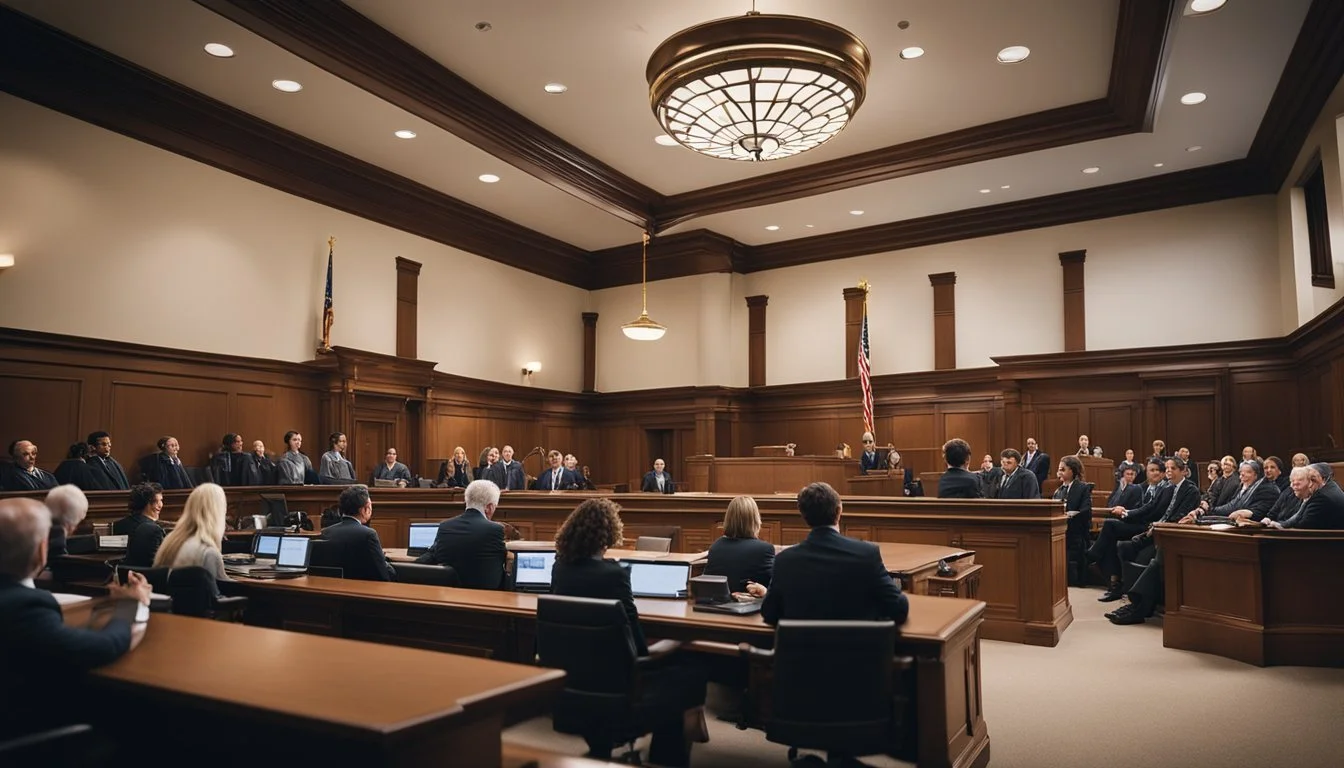7 Must-Watch Documentaries on White-Collar Crime in Pennsylvania
Unraveling Financial Deception
White-collar crime, often hidden behind the facades of legitimate business practices, has significant impacts on communities and economies. These criminal activities range from fraud to embezzlement, frequently involving complex schemes that require thorough investigation and considerable resources to uncover.
Exploring white-collar crime through documentaries offers a unique lens on the intricate workings and consequences of these offenses. Pennsylvania, with its varied financial and corporate landscape, provides a compelling backdrop for examining such crimes. These documentaries not only reveal the methods and motives behind these illicit activities but also highlight the broader legal and ethical ramifications.
1) Enron: The Smartest Guys in the Room (2005)
"Enron: The Smartest Guys in the Room" provides an inside look at one of America's most notorious corporate scandals. Directed by Alex Gibney, the documentary is based on a book by Fortune Magazine reporters Bethany McLean and Peter Elkind.
The film delves into the rise and fall of Enron Corporation, once the seventh-largest company in the United States. It exposes how fraudulent practices and unethical business tactics by the company's executives led to Enron's collapse.
Key figures such as Kenneth Lay, Jeffrey Skilling, and Andrew Fastow are examined in detail. Their roles in orchestrating the financial deceit are presented through interviews and archival footage.
The documentary tackles the broader implications of white-collar crime and corporate greed, making it an essential watch for those interested in the darker aspects of business culture.
For more information, visit the IMDB page.
2) Inside Job (2010)
"Inside Job" takes an in-depth look at the global financial crisis of 2008. Directed by Charles Ferguson, the documentary outlines how the financial industry led the world into economic turmoil.
The film features narration by Matt Damon. It begins by examining the situation in Iceland, which tried American-style banking and suffered severe consequences.
Through interviews with insiders, politicians, and academics, the documentary exposes the corruption and greed that drove the crisis. It highlights the lack of accountability within the banking sector.
"Inside Job" won the Academy Award for Best Documentary Feature in 2011. The film provides a comprehensive overview of the factors contributing to the financial meltdown.
For more information, visit the Inside Job IMDb page.
3) The Panama Papers (2018)
The Panama Papers (2018) is a revealing documentary directed by Alex Winter. It exposes the extensive global corruption scandal that emerged from the leak of 11.5 million documents from the Panamanian law firm Mossack Fonseca.
This massive leak uncovered how the wealthy and powerful worldwide used offshore entities to conceal their wealth and evade taxes.
The documentary features insights from journalists Bastian Obermayer and Frederik Obermaier, who were instrumental in breaking the story. They, along with hundreds of other journalists, analyzed the data and brought to light the complex web of financial deceit.
It showcases the risks these journalists faced and the impact of their findings on governments and regulatory bodies.
For further details on "The Panama Papers," visit IMDB.
4) Dirty Money: Cartel Bank (2018)
"Dirty Money: Cartel Bank" is a notable documentary that dives into the money laundering operations of HSBC, one of the world's largest banks. This film reveals how HSBC became a conduit for the Mexican drug cartels, handling millions of dollars in illicit transactions.
Directed by Kristi Jacobson, the documentary features key figures such as Anabel Hernández, a renowned journalist, and Senator Elizabeth Warren. They provide insights into the systemic failures and oversight within the banking system.
The documentary also includes testimonies from journalists and prosecutors who attempted to hold HSBC accountable. Their efforts highlight the challenges faced in curbing financial crimes at such a high level.
The producers of "Dirty Money: Cartel Bank" utilized the expertise of Brett Wolf from Thomson Reuters to add depth and accuracy to their portrayal. This collaboration ensured a comprehensive look at the underbelly of global finance.
For more information, visit the IMDb page.
5) Chasing Madoff (2011)
"Chasing Madoff" is a gripping documentary directed by Jeff Prosserman. It follows the story of Harry Markopolos and his decade-long quest to expose Bernie Madoff's massive Ponzi scheme.
The film provides an in-depth look at how Markopolos, along with his colleagues, gathered evidence against Madoff.
The documentary presents the frustration and determination Markopolos faced while trying to alert authorities and the financial community to Madoff's fraud. The investigation uncovers the complexities and deceit involved in one of the largest financial frauds in history.
"Chasing Madoff" features interviews with Markopolos and other key figures involved in the investigation. It highlights the significant impact Madoff's scam had on victims and the financial sector.
For more information on the film, visit its Wikipedia page or IMDb page.
6) The China Hustle (2017)
"The China Hustle," directed by Jed Rothstein, is a compelling documentary exploring a massive securities fraud involving Chinese companies listed on the US stock market.
The film showcases the investigative efforts of activist shareholders and due diligence professionals like Dan David and Jon Carnes, who uncover shocking financial crimes.
Produced by Magnolia Pictures, the documentary draws attention to the collaboration between fraudulent Chinese firms and opportunistic American financial entities.
It exposes the systemic loopholes exploited to deceive investors and manipulate stock prices.
The documentary also emphasizes the dire consequences of these fraudulent activities on global markets and individual wallets, making it an essential watch for those interested in high-stakes finance and regulatory oversight.
For more information on "The China Hustle," visit IMDb.
7) The Inventor: Out for Blood in Silicon Valley (2019)
This documentary, directed by Alex Gibney, dives into the rise and fall of Theranos, a healthcare company founded by Elizabeth Holmes. Holmes promised to revolutionize blood testing with her innovative technology.
At one point, Theranos was valued at $9 billion, and Holmes was celebrated as the next Steve Jobs. However, the company collapsed amid accusations of fraud.
The film explores the intense ambition and deceptive practices that led to the company's downfall. Gibney provides a compelling look into the psychology of fraud and the consequences of unfulfilled promises.
Holmes, once the world’s youngest self-made billionaire, saw her empire crumble almost overnight. The documentary is an insightful journey into one of the biggest scandals in Silicon Valley.
Understanding White-Collar Crime
White-collar crime involves non-violent crimes committed primarily by professionals and business people. These crimes seek financial gain through deceptive practices.
Defining White-Collar Crime
White-collar crime refers to financially motivated, non-violent crime typically committed by business and government professionals. The term was first coined by sociologist Edwin Sutherland in 1939. He defined it as a crime committed by a person of respectability and high social status in the course of their occupation.
These crimes involve deceit, concealment, or a violation of trust. Unlike traditional crimes, white-collar crimes do not depend on physical force or violence.
Common Types of White-Collar Crime
Several types of white-collar crime are prevalent. Fraud involves trickery used to gain unfair or unlawful advantages, like mail and wire fraud. Insider trading refers to the illegal buying or selling of a company's stock by individuals with access to confidential information. Embezzlement is when a person in a position of trust misappropriates funds or property.
Money laundering hides the origins of illegally obtained money, usually through complex financial transactions. Additionally, bribery and corruption involve offering or receiving something of value to influence the actions of an official or other person in charge. Identity theft also falls under white-collar crime, where personal information is stolen for fraudulent purposes.
Impact of White-Collar Crime in Pennsylvania
White-collar crime in Pennsylvania affects the state's economy and social fabric. These crimes lead to significant financial losses and can harm public trust.
Economic Consequences
White-collar crimes, such as fraud and embezzlement, cost Pennsylvania businesses millions of dollars annually. Financial institutions, corporations, and small businesses experience direct monetary losses. The ripple effect includes higher insurance premiums and increased consumer prices.
Law enforcement and judicial systems also bear the financial brunt. Resources diverted to investigate and prosecute these crimes can strain local budgets. Furthermore, the state can lose tax revenue when businesses close or cut back due to financial instability caused by such crimes.
Some notable cases highlight the profound economic impact. For example, fraudulent schemes like Ponzi schemes can wipe out life savings for many individuals, leading to a broader economic downturn.
Social Implications
The social implications of white-collar crime in Pennsylvania include eroded public trust and increased stress within communities. When prominent businesses and leaders are implicated, the public may become skeptical of authority figures and institutions.
The victims often face severe mental and emotional stress. Loss of savings, financial security, and employment prospects can lead to long-term psychological effects, impacting families and communities.
High-profile cases can draw significant media attention, which might lead to public outrage and demand for stricter regulations. However, this attention can also bring about skepticism, making it difficult for honest enterprises to gain trust.
Addressing these social challenges requires a concerted effort from community leaders, businesses, and policymakers to restore and maintain confidence.
Notable Cases of White-Collar Crime in Pennsylvania
Pennsylvania has seen its share of significant white-collar crime cases that have captured public attention. These cases often involve complex financial schemes, high-profile individuals, and substantial legal consequences.
High-Profile Cases
Kidder Peabody & Co.: In the 1990s, Pennsylvania-based investment banker Joseph Jett was accused of fraudulent trading activities at Kidder Peabody & Co. His actions led to significant financial losses and highlighted the need for stricter regulatory oversight in the securities industry.
Tyco International Scandal: While Tyco's operations were primarily in Delaware, significant activities and legal proceedings occurred in Pennsylvania. CEO Dennis Kozlowski and CFO Mark Swartz were convicted of embezzling $600 million from the company, involving unsanctioned bonuses and personal expenses.
Michael Milken: Known as the "junk bond king," Milken operated a significant part of his business from Drexel Burnham Lambert in Philadelphia. He was indicted for securities fraud and racketeering, leading to a decade-defining financial scandal.
Legal Outcomes and Sentencing
Joseph Jett: The fallout from the Kidder Peabody scandal resulted in his termination and a lifetime ban from the securities industry. The SEC also imposed heavy penalties on the firm, highlighting institutional failures in compliance and oversight.
Dennis Kozlowski and Mark Swartz: Both executives faced criminal charges, leading to prison sentences of 8 to 25 years. Their case became a symbol of corporate greed, and subsequent legal reforms aimed to curb executive misconduct.
Michael Milken: After pleading guilty to securities fraud, Milken was sentenced to 10 years in prison. He served 22 months before a reduced sentence for cooperating with the government. His case prompted substantial regulatory changes in the securities market.






